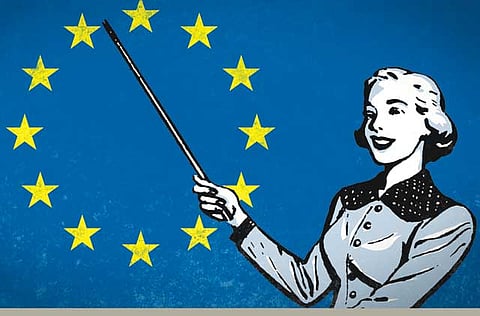Reviving trust in Europe
Giving substance to democracy will be a good start for EU policymakers

What, by December 31, 2014, will constitute a successful year for Europe? A broad economic recovery and a steady healing of the wounds inflicted by the sovereign debt and financial sector crises, would certainly be welcome — as would an international achievement such as a US-European free-trade deal. Best of all, however, would be a restoration of the people’s dwindling faith in political institutions at national and European Union (EU) levels. This is at once the biggest and the most elusive prize.
One year is too short to judge whether the tide is turning. Public trust in governments and the EU has been slipping for about six years. The causes of the decline go back further still. Nevertheless, certain events scheduled for this year will give a measure of progress accomplished or opportunities missed.
Most prominent are the elections in May to the European parliament. A big rise in support for populist, anti-establishment, anti-EU political movements, combined with another drop in voter participation rates, would be a bad sign. On a brighter note, EU leaders will strive to avert a confrontation between the newly-elected assembly and national governments over the new European Commission president — a dispute that, for many Europeans, will sum up all that is obscure and pointless about the EU.
Elsewhere, the resilience of two of Europe’s oldest states, the United Kingdom and Spain, will be tested in a September referendum on independence in Scotland and, if the authorities in Madrid do not block it, a similar plebiscite two months later in Catalonia. Whatever the outcome, the significance of these votes is that substantial numbers of Scots and Catalans will serve formal notice that they no longer regard political institutions headquartered in London and Madrid as meeting their needs. Even if the pro-independence forces lose, the central UK and Spanish governments ought to respond to the clamour for expanded self-rule in Scotland and Catalonia.
However, a decline in public confidence in Europe’s governing classes is wider and it relates to technocrats as well as politicians. According to a Eurobarometer poll, trust in the EU had slumped from 57 per cent in 2007 to 31 per cent last May. Some 29 per cent of respondents expressed negative feelings about the EU — an all-time high and double the level recorded six years earlier. Trust in national governments, meanwhile, was at 25 per cent, down from 41.
Recession, unemployment and stagnant or falling living standards account partly for these trends. So does the restructuring of the welfare state, which in the second half of the 20th century was a core element of the European social contract that blunted political extremism and solidified support for capitalism and democracy. It would be a mistake, though, to overlook non-economic factors such as corruption scandals, immigration and the crumbling of once rock-hard voter loyalties to mass political parties. Underlying everything is the frustration of Europeans that they exert less influence than ever over the decisions of elites, both in their own countries and in Brussels.
In the Eurozone — which, with Latvia’s entry last week, now groups 18 of the EU’s 28 member states — many politicians and citizens are still coming to terms with the reality that, in a monetary union, policy choices cannot be a matter of exclusive national concern. In debtor countries such as Greece and Spain, but also in states such as France and Italy that drag their heels on reform, the perception is taking hold that society is at the mercy of pitiless external forces — Germany or globalisation, bankers or Brussels — and is being punished for the misguided prescriptions of outsiders.
Laszlo Andor, the EU Employment Commissioner, terms these prescriptions “the Maastricht orthodoxy”. He is alluding to the EU’s 1992 Maastricht treaty, which mapped out Europe’s monetary union but made no provisions for fiscal transfers or deep political integration. In a December article for Vox, an economic research website, Andor wrote: “Sticking to the Maastricht orthodoxy will lead to a steady weakening of the pro-European mainstream in southern European countries and some of these countries may not be far from a disastrous situation where Eurozone membership and democracy are no longer compatible.”
In the past two years, such warnings have grown more frequent. Less apocalyptically, one may observe that in Greece, for instance, what proved incompatible were not Eurozone membership and democracy, but Eurozone membership and a democracy permeated by clientelism and corruption. These defects long preceded the Eurozone’s birth. Germany and other creditor nations bore no blame for them.
That said, Europe’s north-south divide is unlikely to disappear this year. It will not escape the attention of vulnerable Eurozone countries that, as they receive yet more instructions to shrink the welfare state and cut wages, the coalition in Berlin will be preparing to increase pension benefits for Germans and to soften labour market reforms introduced before 2005. This sense of unfairness will be heightened by a proposal of Angela Merkel, Germany’s Chancellor, for “contracts” under which Eurozone governments make binding promises to adopt specific economic reforms.
Even strong economic growth and job creation — challenging goals in themselves — will not be enough in 2014, or later, to rebuild confidence in European politics. Leaders must educate citizens better on the benefits and responsibilities of Eurozone membership. In the EU as a whole, it will help if the voices of national parliaments counted for more. There are no magic solutions, but giving substance to democracy will be a good start.
— Financial Times


